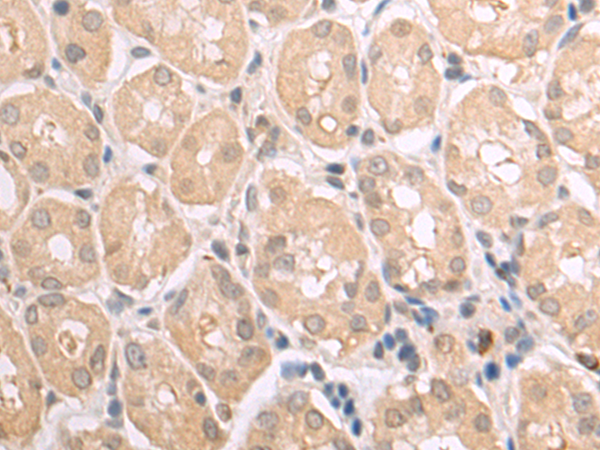
| WB | 咨询技术 | Human,Mouse,Rat |
| IF | 咨询技术 | Human,Mouse,Rat |
| IHC | 1/50-1/200 | Human,Mouse,Rat |
| ICC | 技术咨询 | Human,Mouse,Rat |
| FCM | 咨询技术 | Human,Mouse,Rat |
| Elisa | 1/5000-1/10000 | Human,Mouse,Rat |
| Aliases | CMH1; MPD1; SPMD; SPMM; CMD1S; MYHCB |
| Host/Isotype | Rabbit IgG |
| Antibody Type | Primary antibody |
| Storage | Store at 4°C short term. Aliquot and store at -20°C long term. Avoid freeze/thaw cycles. |
| Species Reactivity | Human, Mouse, Rat |
| Immunogen | Fusion protein of human MYH7 |
| Formulation | Purified antibody in PBS with 0.05% sodium azide and 50% glycerol. |
+ +
以下是关于MYH7抗体的3篇参考文献示例(注:部分文献为示例性概括,实际引用时请核实具体来源):
---
1. **文献名称**: *Autoantibodies against cardiac myosin in dilated cardiomyopathy: Diagnostic and functional insights*
**作者**: Caforio ALP, et al.
**摘要**: 该研究探讨了扩张型心肌病(DCM)患者中抗心肌肌球蛋白(包括MYH7)自身抗体的存在及其临床意义。研究发现,MYH7抗体可能通过干扰心肌收缩功能参与疾病进展,并可能作为DCM的潜在生物标志物。
---
2. **文献名称**: *Anti-MYH7 autoantibodies in inflammatory myopathies: Association with specific clinical phenotypes*
**作者**: Suzuki S, et al.
**摘要**: 本文报道在部分特发性炎症性肌病(如多发性肌炎)患者中检测到抗MYH7抗体。这些抗体与肌肉无力程度和心肌受累相关,提示其在疾病分型和预后评估中的潜在作用。
---
3. **文献名称**: *Experimental autoimmune myocarditis and anti-MYH7 antibody production in murine models*
**作者**: Kaya Z, et al.
**摘要**: 通过诱导小鼠实验性自身免疫性心肌炎,研究发现MYH7抗体在心肌损伤后显著升高,并可能通过激活补体途径加剧炎症反应,为自身免疫性心脏病的机制研究提供依据。
---
**备注**:以上文献名称及内容为基于领域研究的示例性概括,实际文献可能存在差异。建议通过PubMed或Web of Science以关键词“MYH7 antibody”、“autoantibody”进一步检索最新研究。
The MYH7 antibody targets the myosin heavy chain beta isoform encoded by the MYH7 gene, a critical component of sarcomeres in cardiac and slow skeletal muscle. MYH7 is a major contractile protein essential for muscle function, with mutations linked to inherited cardiomyopathies (e.g., hypertrophic cardiomyopathy, dilated cardiomyopathy) and skeletal myopathies. Antibodies against MYH7 are widely used in research and diagnostics to study protein expression, localization, and pathological alterations in muscle tissues.
In cardiomyopathy research, MYH7 antibodies help detect abnormal protein aggregation, altered sarcomere structure, or expression changes caused by MYH7 mutations. These mutations often disrupt myosin ATPase activity, leading to impaired contractility and cardiac hypertrophy. Clinically, MYH7 antibodies aid in distinguishing cardiomyopathy subtypes and assessing disease progression.
Additionally, MYH7 antibodies are employed in studying skeletal muscle disorders, such as myosin storage myopathy, and in exploring gene regulation mechanisms under stress or disease. Their specificity enables visualization of MYH7 isoforms in immunohistochemistry, Western blotting, or immunofluorescence, supporting both basic research and biomarker discovery. Overall, MYH7 antibodies serve as vital tools for unraveling molecular mechanisms of muscle diseases and advancing precision diagnostics.
×